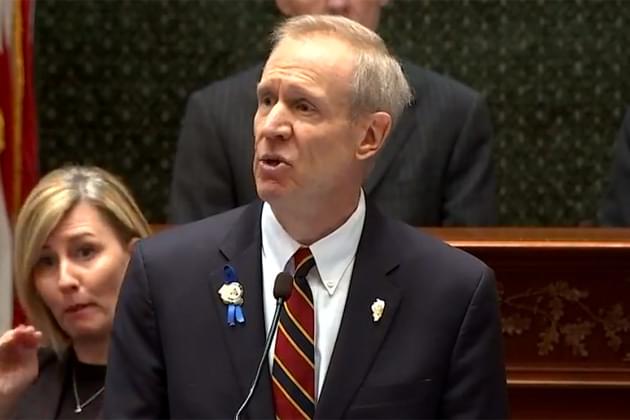
By Greg Bishop/Illinois Radio Network
SPRINGFIELD – Gov. Bruce Rauner said he will sign a budget that passed both chambers for the first time in his three-and-a-half years as the state’s chief executive despite concerns from a small group of lawmakers who said the budget isn’t balanced.
Critics said the budget was crafted in secret, passed just before deadline and isn’t actually balanced.
One of the two “no” votes in the Senate on Wednesday, state Sen. Kyle McCarter, said the $38.5 billion budget isn’t balanced because it doesn’t address pensions and other debt.
“You’ve got $150 billion in debt and your pensions are underfunded and near bankrupt,” said McCarter, R-Lebanon. “You have to spend less and put it toward what you owe and they refuse to do that.”
Following the Senate’s approval Wednesday, the House passed the plan Thursday, the final day of session.
The plan does include some pension savings, but those are estimates based off several buyout schemes that are entirely voluntary and not guaranteed.
State Rep. Greg Harris, D-Chicago, who was one of the budgeteers putting the numbers together behind closed doors, said the process of crafting the budget that dropped on lawmakers with less than 48 hours before the deadline was bipartisan.
“It’s now our time to govern because this is our opportunity now to pass legislation to show that we can work together,” Harris said.
The vote in the House was 97-18 for the spending plan and 100-14 for the budget implementation bill, the measure that included fund transfers, the pension buyout plans and other budget enacting language.
Several representatives said they had less than a day to review the 1,245-page budget.
During debate Thursday, State Rep. Jeanne Ives, R-Wheaton, said legislators’ constituents likely had no input.
“You are collectively ruled by a handful of folks that are part of the political ruling class in the state of Illinois that have been controlling this state for decades,” Ives said.
State Rep. Allen Skillicorn, R-East Dundee, said the state should have to follow the same standards that local governments have to follow when it comes to budgeting.
“The state of Illinois requires all local governments to have a 30-day waiting period before passing a budget,” he said. “So that budget is public, there’s a hearing, and they have to wait 30 days until they can pass it so that everyone in the public can vote for it. I wonder why that’s good for local municipalities but not good for the legislature.”
Skillicorn was a “no” vote. He said some of the things may be good, such as the pension buyout scheme, but he opposed the overall bill because it was a last-minute plan that included money for abortions and pet projects.
“I can’t vote for a budget that includes $170 million taken from the road fund for the Obama Library [in Chicago],” Skillicorn said. “[The budget] includes $20-$30 million for taxpayer funded abortions, those are things I can’t vote for.”
Although Rauner said Thursday the plan does not include much-needed debt paydown and reforms that would reduce taxes and grow the economy, he plans to sign the combined 2,000 page spending plan soon.
“We cut government bureaucracy like high-paid consultants and duplicative IT systems at state agencies to invest our finite resources in critical services, provide $350 million in new funding for public schools, and reverse the governor’s cuts to education programs, health care, child care and senior services,” House speaker Michael Madigan, D-Chicago, said in a statement. “While there is more work to be done, this compromise budget shows yet again that when extreme demands are not preconditions to negotiation, Democrats and Republicans in the Legislature can work together to move Illinois forward.”
Madigan said the budget would yield a $15 million surplus, which would used to pay down old bills.
The state had more than $6.6 billion in old bills as of Thursday morning. At a rate of $15 million a year, it would take more than 440 years to wipe out the state’s debt, not factoring for interest penalties and other factors.
The backlog of bills was up to $16 billion after an unprecedented two-and-a-half year budget impasse, but the state borrowed $6 billion to pay down some of that debt.






